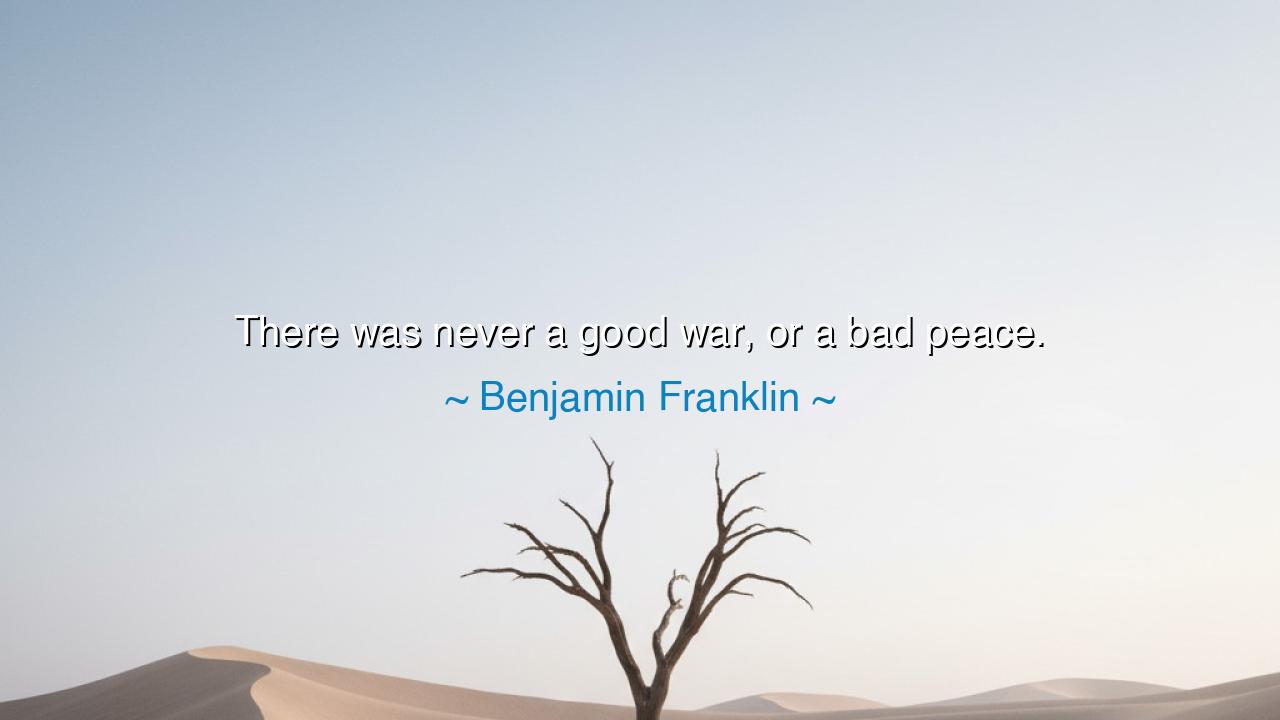
There was never a good war, or a bad peace.






The words of Benjamin Franklin—“There was never a good war, or a bad peace”—echo like the solemn toll of an ancient bell, warning all who hear them of the true cost of conflict. Spoken by one who lived through the fires of revolution, they carry the weight of both wisdom and sorrow. Franklin, who saw firsthand the blood and ruin of battle, did not glorify war as a noble endeavor, but rather unveiled its true nature: devastation for the many, profit only for the few. To him, there was no good war, for even when fought for righteous causes, its toll upon human lives, upon families, upon the land itself, is always bitter. And conversely, there is no bad peace, for peace, even if fragile, brings the chance for healing, rebuilding, and the quiet dignity of human flourishing.
The origin of this saying lies in the closing years of Franklin’s life, when the Revolutionary War had ended and the fragile peace of the new republic had begun. Though he was a founding father of liberty, Franklin knew that independence had been purchased at a terrible price. He had seen soldiers fall, families starve, and nations tremble. And in his wisdom, he understood that even a victorious war is drenched in sorrow, while even an uneasy peace holds more promise for human happiness than the noblest battlefield triumph. Thus, he spoke these words as both counsel and caution, a warning to future generations not to rush into bloodshed with romantic illusions, nor to despise peace when it comes clothed in imperfection.
Consider the tale of World War I, called by many “the war to end all wars.” It began with pride, with nations boasting of honor and destiny, but it ended with millions dead, fields soaked in blood, and entire generations scarred. And when the cannons ceased, what did peace bring? Though fragile and incomplete, even the flawed peace of Versailles allowed mothers to see their sons again, allowed nations to bury their dead and to plant once more in ruined soil. Was that peace perfect? No. But was it better than the horror that preceded it? Unquestionably. Franklin’s words shine through history: never a good war, never a bad peace.
Yet there are those who speak of “just wars,” and indeed, there are times when men have taken up arms against tyranny and oppression. Franklin himself did not deny the necessity of struggle; he lent his hand to the American Revolution. But his wisdom was this: even when war is necessary, it is never good. It is a bitter medicine swallowed only when the sickness of tyranny leaves no other cure. For war always leaves behind scars—widows without husbands, children without fathers, nations without innocence. Let us not call such sorrow “good,” though it may sometimes be unavoidable.
In contrast, even an imperfect peace carries within it the seed of hope. Think of South Africa at the fall of apartheid. The wounds of injustice ran deep, and bitterness threatened to consume the land. Yet Mandela, choosing reconciliation over vengeance, preserved peace where many expected civil war. That peace was not without flaw, nor without struggle, but it allowed a nation to breathe again, to begin the long labor of healing. It was proof of Franklin’s wisdom: a flawed peace is still more life-giving than the most righteous war.
The lesson of Franklin’s words is plain, yet profound: do not be deceived by the glamor of war, nor disdain the quiet strength of peace. The drums of battle may stir the heart, but they also silence the cries of the innocent. The calm of peace may seem dull, but it is in peace that art flourishes, families prosper, and generations rise without fear. The wise leader, the wise citizen, is the one who seeks peace first, and turns to war only when every other path has been exhausted.
Practically, let each of us live as peacemakers. In our homes, let us put aside needless quarrels. In our communities, let us build bridges rather than walls. And in our nations, let us hold leaders accountable, urging them to exhaust every avenue of diplomacy before sounding the trumpet of war. For Franklin’s words are not mere reflections of the past; they are a commandment for the future: seek peace, cherish it, defend it, and never forget that war, however dressed in noble garments, always carries the stench of sorrow.
Thus, let these words be carved not only in books but in the hearts of men: “There was never a good war, or a bad peace.” May they guide the decisions of rulers and the lives of common folk alike, that humanity may rise above the cycle of bloodshed and find its true glory not in battle, but in the enduring strength of peace.






AAdministratorAdministrator
Welcome, honored guests. Please leave a comment, we will respond soon